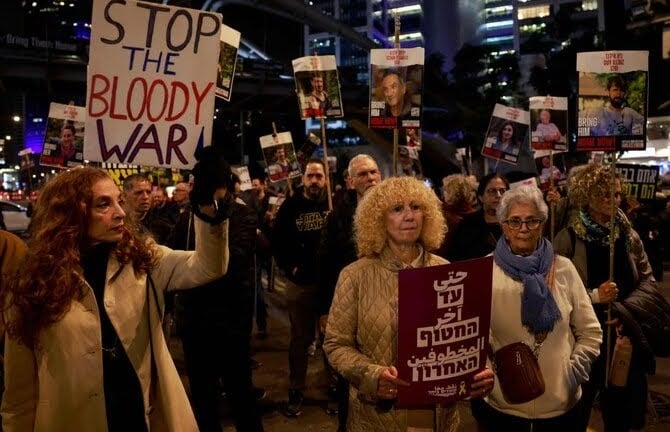Growing International Condemnation of Israel: European Sanctions and War Crimes Accusations Over Gaza War
European countries impose sanctions on Israel amid Gaza war, citing war crimes and humanitarian violations. A shift in Western policy is underway.
NEWS
Refaat Ibrahim
6/11/20253 min read


Western Sanctions on Israeli Ministers Amid Ongoing Gaza Offensive
Amid the ongoing Israeli assault on the Gaza Strip, international condemnation of Israel has intensified. Since Israel resumed its military campaign on March 18, 2025, following the end of a temporary ceasefire, it has imposed a complete blockade on Gaza, shutting all crossings and preventing humanitarian aid from entering. This has significantly worsened the humanitarian catastrophe in the besieged enclave.
The escalation has drawn sharp criticism from international organizations and states, with many labeling Israel’s actions as genocidal warfare and crimes against humanity. In a significant shift, some traditionally pro-Israel Western nations have moved from mere rhetorical condemnation to imposing actual sanctions on Israeli officials, marking a potential turning point in European policy on the Israeli-Palestinian conflict.
Global Reactions: From Statements to Action Against Israel
UN Secretary-General: Gaza Is a "Killing Ground"
On April 8, 2025, UN Secretary-General António Guterres described Gaza as a "killing ground" during a press conference, warning of an "endless cycle of death." He stressed that the closure of crossings since March has cut off food, medicine, and fuel to 2.3 million people.
European Nations Condemn Forced Displacement
On May 7, six European countries, Ireland, Spain, Slovenia, Luxembourg, Norway, and Iceland, issued a joint statement denouncing Israel's attempts to forcibly displace Gaza residents as a violation of international law, affirming that Gaza is "an integral part of the State of Palestine."
France, UK, and Canada Suspend Trade Talks
French President Emmanuel Macron on May 14 called Israeli actions in Gaza "disgraceful" and urged a reassessment of partnership agreements with Tel Aviv. Days later, on May 20, France, the UK, and Canada suspended free trade negotiations with Israel, stating that denying humanitarian aid may constitute a breach of international humanitarian law.
Spain and Germany Join in Criticism
On May 25, Spain's foreign minister called for international sanctions against Israel, declaring that the war "no longer serves any purpose" and demanding unimpeded humanitarian access to Gaza.
On May 27, German Chancellor Friedrich Merz issued Germany’s strongest criticism yet, stating that Israel’s attacks were no longer justifiable. German Foreign Minister Johann Vadipol emphasized that solidarity with Israel should not be imposed and that combating anti-Semitism must not be misused to justify aggression.
UK PM and Macron Renew Pressure in June
On June 2, UK Prime Minister Keir Starmer labeled the situation in Gaza "unbearable," renewing calls for a ceasefire and threatening further sanctions. On June 9, President Macron described the Israeli blockade as “outrageous,” urging immediate opening of Gaza’s crossings for humanitarian aid.
A Shift in European Policy Toward Israel: From Support to Sanctions
The current wave of European reactions marks an unprecedented shift in how the EU engages with Israel. For decades, the EU maintained conditional support for Israel, favoring diplomatic balance and advocating for a two-state solution without concrete measures. But since April 2025, the narrative has fundamentally changed.
1. From Rhetoric to Real Action
European condemnation has evolved from statements to concrete measures such as suspending trade agreements and imposing targeted sanctions. Notably, Israeli National Security Minister Itamar Ben-Gvir and Finance Minister Bezalel Smotrich were sanctioned by multiple countries, including the UK, Canada, Norway, Australia, and New Zealand.
2. Reassessment of Strategic Partnerships
Within the EU, there are growing calls to reconsider the EU-Israel Association Agreement, potentially suspending long-standing economic and trade benefits granted to Israel.
3. Legal Accountability for War Crimes
European governments are also hinting at support for international legal proceedings against Israel through the International Court of Justice (ICJ) or the International Criminal Court (ICC), citing widespread violations of human rights in Gaza.
4. Rising Grassroots and Civil Society Pressure
These official actions have been reinforced by widespread public pressure, including student-led protests, trade unions, and independent media outlets demanding an end to Western complicity in Israeli policies.
Is This the End of the West’s Political Cover for Israel?
While this shift doesn’t necessarily signal the complete end of Western support for Israel, it clearly indicates that unquestioned silence is no longer guaranteed. Israel now faces growing diplomatic isolation and a potential reevaluation of its international image and strategic alliances.
Should the blockade and military assault on Gaza continue, we may soon see tougher measures, including the suspension of military and tech cooperation agreements and collective legal action in the UN Human Rights Council or international courts.
A Political and Moral Awakening in Europe
This slow yet significant transformation reflects a broader political and moral awakening in Europe, one that reaffirms the importance of international law and the rights of occupied populations. As the humanitarian crisis in Gaza deepens, global voices are increasingly calling for justice, accountability, and the urgent need to end the suffering.
Awareness
Documenting reality, amplifying Palestinian voices, raising awareness.
Contact Us:
resistant.p.pens@gmail.com
Follow our social media
